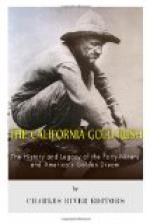If limitations of space and subject permitted, it would be pleasant to portray the romantic life of those pastoral days. Arcadian conditions were then more nearly attained than perhaps at any other time in the world’s history. The picturesque, easy, idle, pleasant, fiery, aristocratic life has been elsewhere so well depicted that it has taken on the quality of rosy legend. Nobody did any more work than it pleased him to do; everybody was well-fed and happy; the women were beautiful and chaste; the men were bold, fiery, spirited, gracefully idle; life was a succession of picturesque merrymakings, lovemakings, intrigues, visits, lavish hospitalities, harmless politics, and revolutions. To be sure, there were but few signs of progressive spirit. People traveled on horseback because roads did not exist. They wore silks and diamonds, lace and satin, but their houses were crude, and conveniences were simple or entirely lacking. Their very vehicles, with wooden axles and wheels made of the cross-section of a tree, were such as an East African savage would be ashamed of. But who cared? And since no one wished improvements, why worry about them?
Certainly, judged by the standards of a truly progressive race, the Spanish occupation had many shortcomings. Agriculture was so little known that at times the country nearly starved. Contemporary travelers mention this fact with wonder. “There is,” says Ryan, “very little land under cultivation in the vicinity of Monterey. That which strikes the foreigner most is the utter neglect in which the soil is left and the indifference with which the most charming sites are regarded. In the hands of the English and Americans, Monterey would be a beautiful town adorned with gardens and orchards and surrounded with picturesque walks and drives. The natives are, unfortunately, too ignorant to appreciate and too indolent even to attempt such improvement.” And Captain Charles Wilkes asserts that “notwithstanding the immense number of domestic animals in the country, the Californians were too lazy to make butter or cheese, and even milk was rare. If there was a little good soap and leather occasionally found, the people were too indolent to make them in any quantity. The earth was simply scratched a few inches by a mean and ill-contrived plow. When the ground had been turned up by repeated scratching, it was hoed down and the clods broken by dragging over it huge branches of trees. Threshing was performed by spreading the cut grain on a spot of hard ground, treading it with cattle, and after taking off the straw throwing the remainder up in the breeze, much was lost and what was saved was foul.”
General shiftlessness and inertia extended also to those branches wherein the Californian was supposed to excel. Even in the matter of cattle and sheep, the stock was very inferior to that brought into the country by the Americans, and such a thing as crossing stock or improving the breed of either cattle or horses was never thought of. The cattle were long-horned, rough-skinned animals, and the beef was tough and coarse. The sheep, while of Spanish stock, were very far from being Spanish merino. Their wool was of the poorest quality, entirely unfit for exportation, and their meat was not a favorite food.




